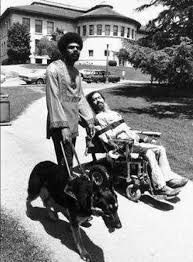For Black History Month, we’re profiling Black leaders in the disability rights movement. Check back all month for more!
Donald Galloway (1938–2011) was a fierce advocate for the rights of people with disabilities and for the inclusion of people of color in the disability rights movement. Born in Washington, D.C., Galloway was blinded by an accident as a teenager but refused to let his disability interfere with his education or his activism—he was active in his local junior NAACP chapter and was a junior member of the National Federation for the Blind.

Donald Galloway and Ed Roberts in 1974
After receiving a master’s degree in social work, Galloway worked at Berkeley’s Center for Independent Living, a hub of the disability rights movement in the 1970s. He went on to serve as the executive director for the Colorado Governor’s Council on Disability in Denver and to direct Peace Corps operations in Jamaica, before running the Center for Independent Living’s Washington, D.C. branch. He also worked in the disability affairs branch of the D.C. Department of Housing and Community Development and the D.C. Department of Consumer and Regulatory Affairs.
Galloway’s advocacy was not limited to his career, however. In 1991, Galloway was called for jury service by the D.C. Superior Court—but when he arrived in the courtroom with his guide dog, he was dismissed by the judge on the grounds that being unable to see the proceedings meant he could not fulfill the duties of a juror. He sued the District, and in 1993 a District judge ruled that automatically disqualifying blind people from jury service was unconstitutional. As many have argued in subsequent court cases, juries are meant to represent a cross-section of the defendant’s peers—and that should include people with disabilities.
Galloway’s work at the intersection of racial and disability justice helped ensure that Black voices became part of the disability rights conversation. Through his work in the independent living community and his legal efforts to ensure people with disabilities retain their Constitutional rights, Galloway made a major impact that resonates to this day.
Today we honor him as part of Black History Month.
Sources for this piece include the Washington Post and Lead On Network.
Comments are closed.